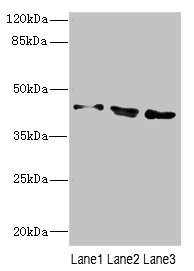CAMK1D Antibody
-
货号:CSB-PA812863ESR2HU
-
规格:¥440
-
促销:
-
图片:
-
其他:
产品详情
-
产品名称:Rabbit anti-Homo sapiens (Human) CAMK1D Polyclonal antibody
-
Uniprot No.:Q8IU85
-
基因名:CAMK1D
-
别名:A630059D12Rik antibody; Calcium/calmodulin dependent protein kinase ID antibody; Calcium/calmodulin dependent protein kinase type 1D antibody; Calcium/calmodulin-dependent protein kinase I-delta antibody; Calcium/calmodulin-dependent protein kinase type 1D antibody; CaM K1 antibody; CaM KI delta antibody; CaM kinase I delta antibody; CaM kinase ID antibody; CaM-KI delta antibody; CAMK 1D antibody; CAMK1D antibody; CaMKI delta antibody; CamKI like protein kinase antibody; CamKI-like protein kinase antibody; CaMKID antibody; CKLiK antibody; E030025C11Rik antibody; KCC1D_HUMAN antibody; OTTHUMP00000019119 antibody; OTTHUMP00000019120 antibody; OTTHUMP00000045030 antibody; RP11 462F15.1 antibody
-
宿主:Rabbit
-
反应种属:Human
-
免疫原:Recombinant Human Calcium/calmodulin-dependent protein kinase type 1D protein (1-180AA)
-
免疫原种属:Homo sapiens (Human)
-
标记方式:Non-conjugated
-
克隆类型:Polyclonal
-
抗体亚型:IgG
-
纯化方式:Antigen Affinity Purified
-
浓度:It differs from different batches. Please contact us to confirm it.
-
保存缓冲液:PBS with 0.02% sodium azide, 50% glycerol, pH7.3.
-
产品提供形式:Liquid
-
应用范围:ELISA, WB
-
推荐稀释比:
Application Recommended Dilution WB 1:1000-1:5000 -
Protocols:
-
储存条件:Upon receipt, store at -20°C or -80°C. Avoid repeated freeze.
-
货期:Basically, we can dispatch the products out in 1-3 working days after receiving your orders. Delivery time maybe differs from different purchasing way or location, please kindly consult your local distributors for specific delivery time.
相关产品
靶点详情
-
功能:Calcium/calmodulin-dependent protein kinase that operates in the calcium-triggered CaMKK-CaMK1 signaling cascade and, upon calcium influx, activates CREB-dependent gene transcription, regulates calcium-mediated granulocyte function and respiratory burst and promotes basal dendritic growth of hippocampal neurons. In neutrophil cells, required for cytokine-induced proliferative responses and activation of the respiratory burst. Activates the transcription factor CREB1 in hippocampal neuron nuclei. May play a role in apoptosis of erythroleukemia cells. In vitro, phosphorylates transcription factor CREM isoform Beta.
-
基因功能参考文献:
- There were no statistically significant differences in the distribution of CDC123/CAMK1D rs12779790 genotypes and alleles between women with gestational diabetes mellitus and healthy pregnant women. PMID: 28079868
- identified the CAMK1D gene as a novel locus associated with blood pressure response to losartan PMID: 25410890
- Association to type 2 diabetes was found for rs13266634 (SLC30A8), rs7923837 (HHEX), rs10811661 (CDKN2A/2B), rs4402960 (IGF2BP2), rs12779790 (CDC123/CAMK1D), and rs2237892 (KCNQ1). PMID: 22923468
- A significant association of rs10906115 in CDC123/CAMK1D and rs1359790 near SPRY2 was identified with type 2 diabetes in a Japanese population. PMID: 21909839
- role of CKLiK in specific granulocyte effector functions such as phagocytosis, respiratory burst, migration, and adhesion PMID: 15840691
- CAMK1D as a novel amplified oncogene linked to epithelial-mesenchymal transition in breast cancer, with elevated expression in invasive carcinomas compared to carcinoma in situ PMID: 19383354
显示更多
收起更多
-
亚细胞定位:Cytoplasm. Nucleus. Note=Predominantly cytoplasmic. Nuclear localization increases upon activation by KCl treatment in hippocampal neurons.
-
蛋白家族:Protein kinase superfamily, CAMK Ser/Thr protein kinase family, CaMK subfamily
-
组织特异性:Widely expressed. Highly and mostly expressed in polymorphonuclear leukocytes (neutrophilic and eosinophilic granulocytes) while little or no expression is observed in monocytes and lymphocytes.
-
数据库链接:
HGNC: 19341
OMIM: 607957
KEGG: hsa:57118
STRING: 9606.ENSP00000368124
UniGene: Hs.600547
Most popular with customers
-
-
YWHAB Recombinant Monoclonal Antibody
Applications: ELISA, WB, IF, FC
Species Reactivity: Human, Mouse, Rat
-
Phospho-YAP1 (S127) Recombinant Monoclonal Antibody
Applications: ELISA, WB, IHC
Species Reactivity: Human
-
-
-
-
-






















